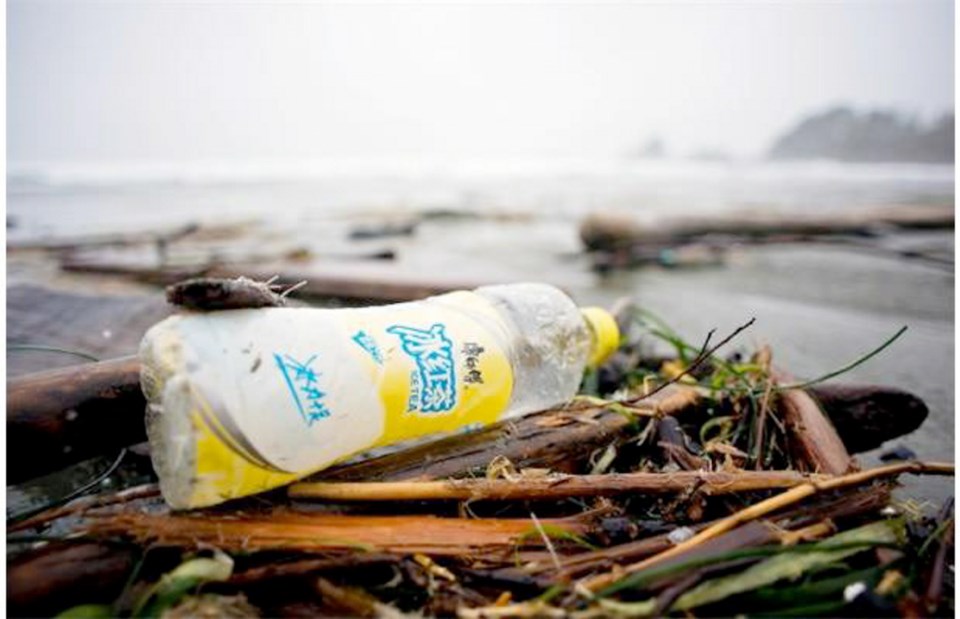Anastasia Castro and Charlotte Brady are co-founders of Kids for a Plastic-Free Canada. Written with Calvin Sandborn, QC, legal director of the UVic Environmental Law Centre.
We two high school students founded Kids for a Plastic-Free Canada — because plastic trash imperils our birthright and clouds our future. We now call on Premier John Horgan to take immediate action to protect the world we will inhabit. Future kids will thank him for it.
The world’s oceans are choking on plastic bags, straws, food wrappers, bottles, Styrofoam and fishing gear — killing 100,000 marine mammals and a million seabirds a year. Scientists have found more than 3,000 plastic particles per cubic metre of water in the Strait of Georgia.
A recent study found microplastics in every batch of Vancouver Island shellfish analyzed. Returning B.C. salmon ingest up to 90 particles of plastic a day. Plastics litter parks, overwhelm landfills, and burden taxpayers.
It’s all such a waste — a massive cost for sake of a flimsy bag used but once. In fact, more than 40 per cent of all plastic is used once and then thrown away. This profligacy drives the never-ending production of new plastics. Global plastic production is doubling every 20 years — and massively contributes to the climate emergency.
But visionary governments are acting. Eight American states and 300 U.S. cities have banned plastic shopping bags. Places like the United Kingdom and Seattle have banned distribution of plastic straws. Other governments have banned Styrofoam cups and food containers.
The European Union is acting to ban a wide range of single-use plastics. Even Prime Minister Justin Trudeau has promised a ban on some single-use products by 2021 (although the form of that ban is highly uncertain).
The B.C. government knows there is a problem. Its recent public consultation on plastics triggered the third highest public response in provincial history. But the burning question is whether government’s policy response will actually be sufficient.
Will government reform the current system, or be satisfied with half-measures?
It’s worth noting that in 1970 B.C. showed remarkable leadership when it adopted North America’s first bottle deposit-refund system. That progressive measure has been copied around the world. It is now time for similar visionary leadership on single-use plastics.
The path forward is obvious — it has been pioneered by the European Union, the City of Vancouver, and others. As articulated in an Environmental Law Centre report that we recently presented to Environment Minister George Heyman, the province needs to:
• Ban single use carrier plastic bags at checkout;
• Ban plastic straws, plastic utensils, plastic drink accessories, polystyrene foam cups and containers (from food and drink vendors);
• Restrict the default use of disposable cups for in-house beverages;
• Require vendors to charge a fee for every disposable cup provided; and
• Require businesses to have reduction plans for plastic and paper disposable cups and food containers.
In addition, the province must act to change the underlying take-out paradigm that drives needless waste. The province can lead a broad partnership of entrepeneurs, systems designers, and other experts to develop innovative ways to facilitate re-use of take-out containers. UBC’s Mugshare Program, Portland’s Go Box system and India’s tiffin carriers all provide good examples of convenient take-out containers that can be washed and continuously re-used.
Furthermore, government can encourage systems (such as shared dishwashing facilities) to allow small retailers to utilize reusable cups and dishes.
It is simply not enough to ban liquor store plastic bags, and tinker around the edges. We need fundamental change that reflects the facts and current public concerns.
Fifty years ago, B.C. was on the right side of history. It pioneered the bottle deposit law — an environmental law widely emulated around the world. We now have the opportunity to again set a global example on single-use plastics.
Fifty years from now, kids will look back and ask: “Faced with compelling scientific evidence, citizen demand for action, and straightforward solutions, did the B.C. government do the right thing — or did they let the planet slowly die?”



